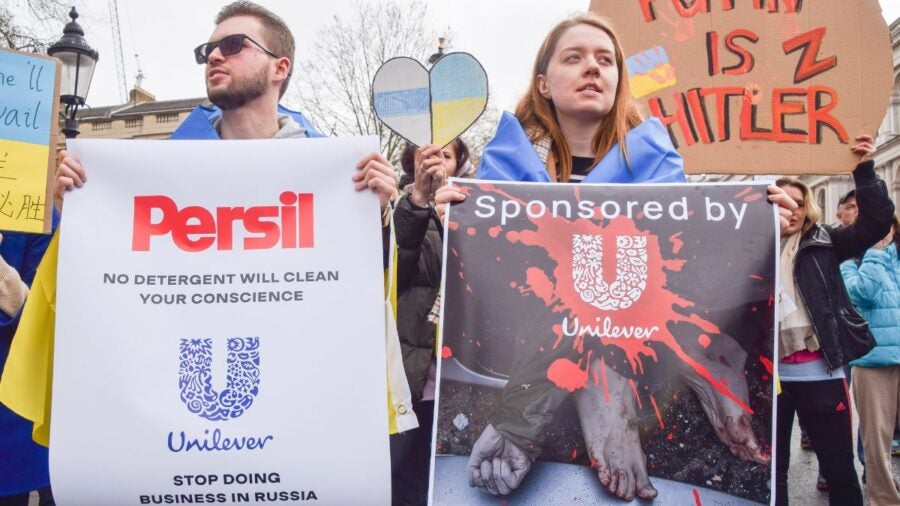
British American Tobacco, Shell and McDonald’s are not the most likely line-up of corporate do-gooders but they can all claim superiority to Unilever in one area – each of these businesses swiftly divested from Russia in the months following the invasion of Ukraine.
A year and a half on, Unilever remains one of a few Western multinationals to continue operating in the country. Despite much criticism, the consumer goods giant, which owns brands including Ben & Jerry’s, Hellmann’s and PG Tips, still employs 3,000 people in Russia.
After months of criticism, and even being labelled an “international sponsor of war”, Unilever has failed to change its stance – it even appeared to double down when confirming that it would allow its Russian workers to be conscripted, if called upon by the army. But it appears that a letter may have finally changed the company’s mind on the matter.
Oleh Symoroz, a Ukrainian soldier who was injured in the war, emailed Unilever’s CEO Hein Schumacher, accusing the company of “hypocrisy” for priding itself on its social purpose, while continuing to operate in Vladimir Putin’s warring state. He wrote: “The choice is rather simple – to choose good over evil, to choose humanity itself.”
The letter leaves Schumacher, who only took on the chief executive role in July, in a difficult position. The original decision to retain Unilever’s eight Russian enterprises was made by his predecessor, Alan Jope, who defended the decision by stating that departing the country would risk its assets falling into Russian state hands. So in some ways, he is a victim of circumstance.
Schumacher is trying to sit on two chairs, and it will not work
But Schumacher’s response reveals that he is likely to continue to toe Jope’s line. In his reply, he noted that the situation was “complex and multi-faceted” and emphasised that there were no “desirable” outcomes, whichever way the business moves. But the question remains, who would find Unilever’s decision to leave Russia undesirable?
It’s clear that the Ukrainian people would not object. On Schumacher’s first day in post, Anna Nolan, of the Ukraine Solidarity Project, asked what it would take for Unilever to divest from Russia, “given the amount of war crimes that we’ve already seen being committed.” She added: “Ukrainians are paying the price for that lack of leadership.”
For Unilever, the decision to exit its Russian businesses may sit more on the side of undesirable. Despite placing “strict constraints”, including halting imports and exports, it continues to sell its range of “essential” food and hygiene products in Russia. This list of essentials still includes ice cream. Unilever’s annual accounts show that the Russian business remains a profit-maker for the group – last year it contributed to 1.4% of the company’s turnover and 2% of the group’s net profit. As of 31 December 2022, Unilever held approximately €900m (£768m) of assets there.
Any divestment will come with a significant financial cost. Shell, for example, estimates that it could lose up to $5bn (£3.9bn) by pulling out of Russia – but that doesn’t mean it shouldn’t be done. The campaign group Leave Russia estimates Unilever will have paid more than $331m in profit tax in the country, which will indirectly “support Russia’s war machine”. The longer Unilever continues to operate there, the more it will contribute.
After taking so long to solidify its stance, Schumacher’s promise to look at the situation again with “fresh eyes” seems hollow. Unilever didn’t hesitate when taking legal action against its subsidiary Ben & Jerry’s when it attempted to pull the brand from shop shelves in the Israeli West Bank – it has since sold the Cookie Dough-maker’s Israeli business to a local licensee.
Unilever has backed itself into a corner on this matter. If the company does finally choose to divest from Russia, it will be a case of too little, too late. Alternatively, continuing its operations will only mean Unilever faces more public scrutiny. As Symoroz says: “So far it indicates more that Schumacher is trying to sit on two chairs, and it will not work.”

British American Tobacco, Shell and McDonald’s are not the most likely line-up of corporate do-gooders but they can all claim superiority to Unilever in one area – each of these businesses swiftly divested from Russia in the months following the invasion of Ukraine.
A year and a half on, Unilever remains one of a few Western multinationals to continue operating in the country. Despite much criticism, the consumer goods giant, which owns brands including Ben & Jerry’s, Hellmann’s and PG Tips, still employs 3,000 people in Russia.
After months of criticism, and even being labelled an “international sponsor of war”, Unilever has failed to change its stance – it even appeared to double down when confirming that it would allow its Russian workers to be conscripted, if called upon by the army. But it appears that a letter may have finally changed the company’s mind on the matter.
